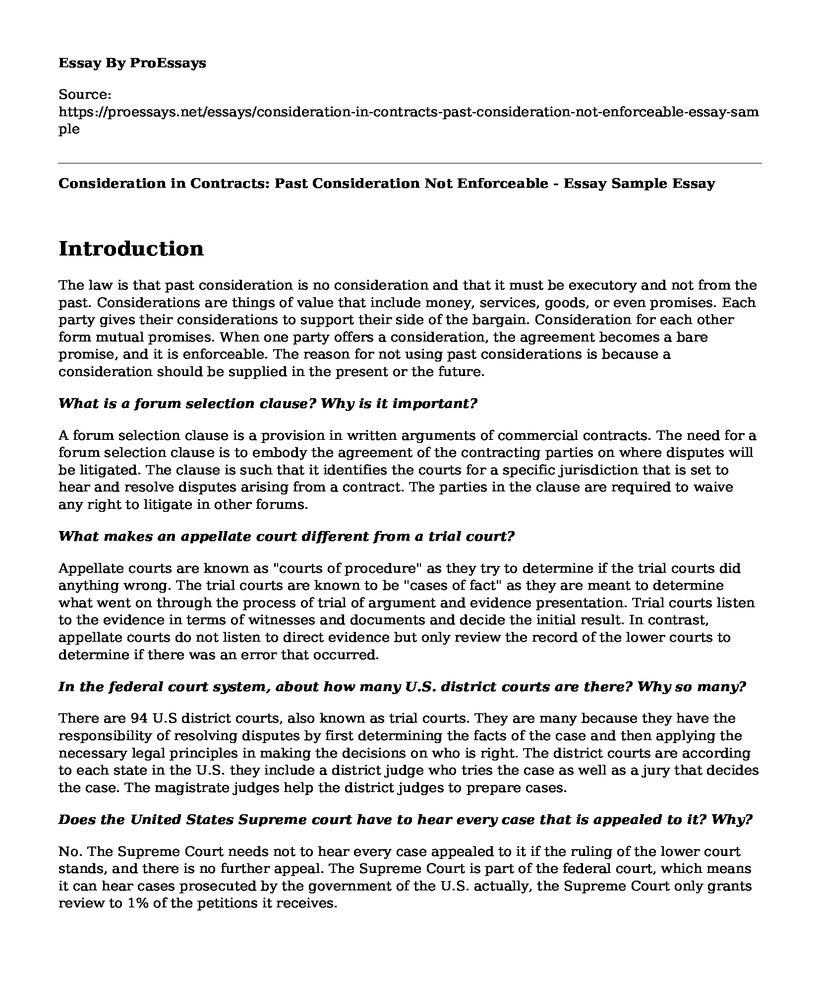Introduction
The law is that past consideration is no consideration and that it must be executory and not from the past. Considerations are things of value that include money, services, goods, or even promises. Each party gives their considerations to support their side of the bargain. Consideration for each other form mutual promises. When one party offers a consideration, the agreement becomes a bare promise, and it is enforceable. The reason for not using past considerations is because a consideration should be supplied in the present or the future.
What is a forum selection clause? Why is it important?
A forum selection clause is a provision in written arguments of commercial contracts. The need for a forum selection clause is to embody the agreement of the contracting parties on where disputes will be litigated. The clause is such that it identifies the courts for a specific jurisdiction that is set to hear and resolve disputes arising from a contract. The parties in the clause are required to waive any right to litigate in other forums.
What makes an appellate court different from a trial court?
Appellate courts are known as "courts of procedure" as they try to determine if the trial courts did anything wrong. The trial courts are known to be "cases of fact" as they are meant to determine what went on through the process of trial of argument and evidence presentation. Trial courts listen to the evidence in terms of witnesses and documents and decide the initial result. In contrast, appellate courts do not listen to direct evidence but only review the record of the lower courts to determine if there was an error that occurred.
In the federal court system, about how many U.S. district courts are there? Why so many?
There are 94 U.S district courts, also known as trial courts. They are many because they have the responsibility of resolving disputes by first determining the facts of the case and then applying the necessary legal principles in making the decisions on who is right. The district courts are according to each state in the U.S. they include a district judge who tries the case as well as a jury that decides the case. The magistrate judges help the district judges to prepare cases.
Does the United States Supreme court have to hear every case that is appealed to it? Why?
No. The Supreme Court needs not to hear every case appealed to it if the ruling of the lower court stands, and there is no further appeal. The Supreme Court is part of the federal court, which means it can hear cases prosecuted by the government of the U.S. actually, the Supreme Court only grants review to 1% of the petitions it receives.
Which are busier, the federal trial courts, or the state trial courts? Why?
The state trial courts are busier than federal trial courts because they listen to most criminal cases and contract cases that are the order of the day. The federal court system listens to specified cases such as disputes between states, bankruptcy, and treaties. The state courts are known as the final arbiters of the constitution and state laws. The state court system handles the majority of the matters within the state that are common such as juveniles, families, and probates.
Cite this page
Consideration in Contracts: Past Consideration Not Enforceable - Essay Sample. (2023, Jun 21). Retrieved from https://proessays.net/essays/consideration-in-contracts-past-consideration-not-enforceable-essay-sample
If you are the original author of this essay and no longer wish to have it published on the ProEssays website, please click below to request its removal:
- Essay on BTK Killer: The Public and Media Trial
- Watkins V. The State Case Study
- Why the President of the US Should Not Be Allowed to Use a Personal Twitter Account
- Role of Terrorism in Homeland Security Paper Example
- Essay on U.S. War on Drugs: Unsuccessful Campaigns, Drug Control, and Military Aid
- Essay Example on CDA 1998: Reforming UK's Failing Youth Justice System
- Paper Example on Ancient Athens: Aristocratic Rule & Poor Oppression







